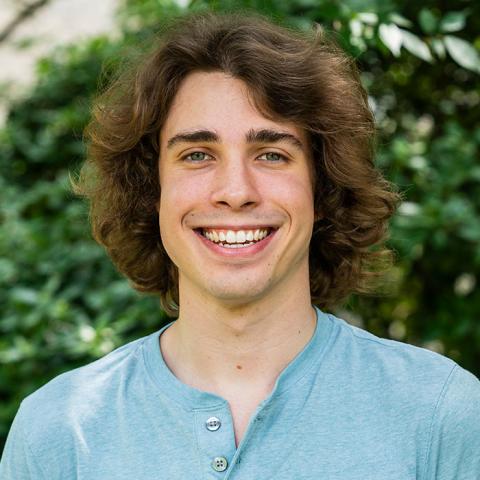Summer Centered: Fords Aid Migrants in Mexico City

The interns in Casa de los Amigos in Mexico City. Left to right: Ian Davis '22, Hannah Yeakey '21, Zoila Regalado BMC '20, Brandon Pita '22. Photo by Patrick Montero.
Details
Three Fords are part of a Bi-Co team of students spending their summer in Mexico City at two nonprofits that support people who have recently returned from or been deported by the U.S. The internship finds them teaching English classes, hosting movie nights, preparing meals, and organizing activists across the region.
Sponsored by the Center for Peace and Global Citizenship (CPGC), Hannah Yeakey ’21, Ian Davis ’22, and Brandon Pita ’22 are spending their summer together in Mexico City, working to support migrants, deportees, and returnees. The three Fords, along with Mawrters Ines Purcell BMC ’20 and Zoila Regalado BMC ’20, juggle a series of different responsibilities, splitting their time between two nonprofit organizations: Casa de Los Amigos and New Comienzos.
“Casa de Los Amigos is a center of peace that was founded by Mexican Quakers, and it has been a long-time partner with the CPGC,” said Pita, who is majoring in sociology and minoring in educational studies. “Volunteers are responsible for taking up a wide array of roles around the center.”
The guest house, which welcomes roughly 200 visitors a year, serves as a center for social justice activism, community engagement, and offers support services for refugees and migrants via short-term housing, language classes, and more. The Bi-Co students often find themselves performing all types of hospitality work, from preparing breakfast for the Casa’s guests to simply sitting and talking with them for hours at a time.
“I also spend about two days a week volunteering with New Comienzos, an organization in the same neighborhood as the Casa de los Amigos that provides support for recently repatriated people from the U.S.,” said Yeakey, who is majoring in political science with a minor in Spanish and a concentration in peace, justice, and human rights.
At New Comienzos, Davis, who is studying psychology, anthropology, and economics on campus, teaches English classes, while Pita is serving as the organization’s interim volunteer director, which means he helps organize volunteer chapters across Mexico and, with the help of deportees, is preparing a comprehensive guide to help those who have recently returned or been deported to their country of origin or are detained and awaiting deportation. Yeakey straddles these responsibilities, helping with English classes as well as organizing.
For all three, their summer work has proven a meaningful opportunity to turn theory into praxis. Although the students come from distinct academic backgrounds, their humanitarian work is a substantive extension of each of their studies. The internship has augmented how the students imagine their studies by empowering them to affect the type of change they are used to discussing in the classroom.
“My studies at Haverford regarding migration and Latin America have given me a lot of necessary background knowledge to be able to better process my experiences here this summer,” said Yeakey. “My work here is largely not academic-related, but the hands-on experience volunteering for these organizations has exposed me to the human side of a lot of my studies at Haverford.”
“While I have only just completed my first year of studies at Haverford, themes related to the classes I have taken in sociology, urban studies, psychology, Spanish, and slavery studies are readily visible here in my work,” added Davis.
For Pita, the internship connects not only to his studies but also to his extracurricular work at Haverford.
“In Mexico City, my perception of the cultural differences that exist and the way I interact with others in the spaces I'm in have all been in some way influenced by the sociology, anthropology, and education courses I've taken in my time at Haverford,” said Pita. “The work I'm doing now is also closely connected to the work I'm engaged with on campus in groups like the Bi-Co Migrants Rights Coalition and the Alliance of Latin American Students where discussions on migration and its connection to the Latinx identity are very common.”
Each of the students was drawn to the internship because of the opportunities it provides to help others and change lives. By working first-hand with South and Central American migrants, returnees, and deportees, the students have been able to make a small difference in a crisis that has dominated news cycles but seen little relief on a systemic level.
“I am invested in this internship because I am searching for the best way I can support people and communities which are struggling, especially people and communities struggling due to the same systems that give me privilege,” said Davis.
Yeakey also notes that the internship has allowed her to see what non-profit work is like as she considers various future career paths.
“I’m interested in this type of work because it’s one of the most concrete things I can do now to both learn about the nuts and bolts of nonprofit organizations while also volunteering and helping in any way needed,” she said.
Pita has found that the internship provides a compelling opportunity for him to consider how his identity impacted the way he grew up and now influences the work he does—in some ways, it’s even changed how he thinks about his background.
“As a Xicano from Chicago’s Southside, studying the way people from different backgrounds interact with one another has always interested me because of the important role my cross-cultural experiences have played in making me who I am today,” said Pita. “I have been able to think about my Xicano identity from a new angle and have developed a deeper understanding and overall connection with my Mexican background as a result of my work with Casa de Los Amigos and New Comienzos this summer.”
“Summer Centered” is a series exploring our students’ Center-funded summer work.




